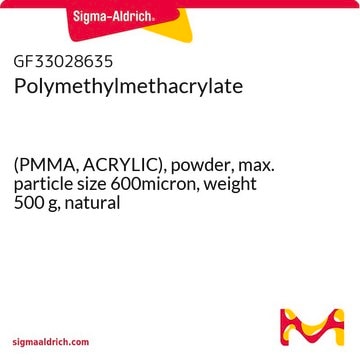208108
Barium titanate(IV)
powder, <3 μm, 99%
Synonym(s):
Titanium barium oxide
Sign Into View Organizational & Contract Pricing
All Photos(3)
About This Item
Linear Formula:
BaTiO3
CAS Number:
Molecular Weight:
233.19
EC Number:
MDL number:
UNSPSC Code:
12161600
PubChem Substance ID:
NACRES:
NA.22
Recommended Products
Quality Level
Assay
99%
form
powder
reaction suitability
core: barium
reagent type: catalyst
reagent type: catalyst
core: titanium
particle size
<3 μm
density
6.08 g/mL at 25 °C (lit.)
SMILES string
[Ba++].[O-][Ti]([O-])=O
InChI
1S/Ba.3O.Ti/q+2;;2*-1;
InChI key
WNKMTAQXMLAYHX-UHFFFAOYSA-N
Looking for similar products? Visit Product Comparison Guide
Application
Barium titanate(IV) possess piezoelectric, ferroelectric, dielectric and thermoelectric properties. It is a biocompatible ceramic and is therefore used generally in drug delivery.
It has been used:
It has been used:
- As a precursor to synthesize barium titanate microfibres to be used as building blocks for self-assembled nanoelectronic devices.
- In multi-material nanoscale 3D printing for developing capacitors, inductors and resistors.
Signal Word
Warning
Hazard Statements
Precautionary Statements
Hazard Classifications
Acute Tox. 4 Inhalation - Acute Tox. 4 Oral
Storage Class Code
11 - Combustible Solids
WGK
WGK 1
Flash Point(F)
Not applicable
Flash Point(C)
Not applicable
Personal Protective Equipment
dust mask type N95 (US), Eyeshields, Gloves
Choose from one of the most recent versions:
Already Own This Product?
Find documentation for the products that you have recently purchased in the Document Library.
Customers Also Viewed
Nanoscale 3D printing process using aerodynamically focused nanoparticle (AFN) printing, micro-machining, and focused ion beam (FIB)
Ahn SH, et al.
CIRP Annals, 64(1), 523-526 (2015)
Preparation of Nanoporous Fibers of BaTiO3 via Electrospinning of BaTiO3/PVC and Thermal Treatment Effects.
Suaste-Gomez E, et al.
Ferroelectrics, 482(1), 1-10 (2015)
Barium titanate nanoparticles: promising multitasking vectors in nanomedicine.
Genchi GG, et al.
Nanotechnology, 27(23), 232001-232001 (2016)
Experimental studies on 3D printing of barium titanate ceramics for medical applications.
Schult M, et al.
Current Directions in Biomedical Engineering, 2(1), 95-99 (2016)
An efficient approach to derive hydroxyl groups on the surface of barium titanate nanoparticles to improve its chemical modification ability.
Chang SJ, et al.
Journal of Colloid and Interface Science, 329(2), 300-305 (2009)
Our team of scientists has experience in all areas of research including Life Science, Material Science, Chemical Synthesis, Chromatography, Analytical and many others.
Contact Technical Service









